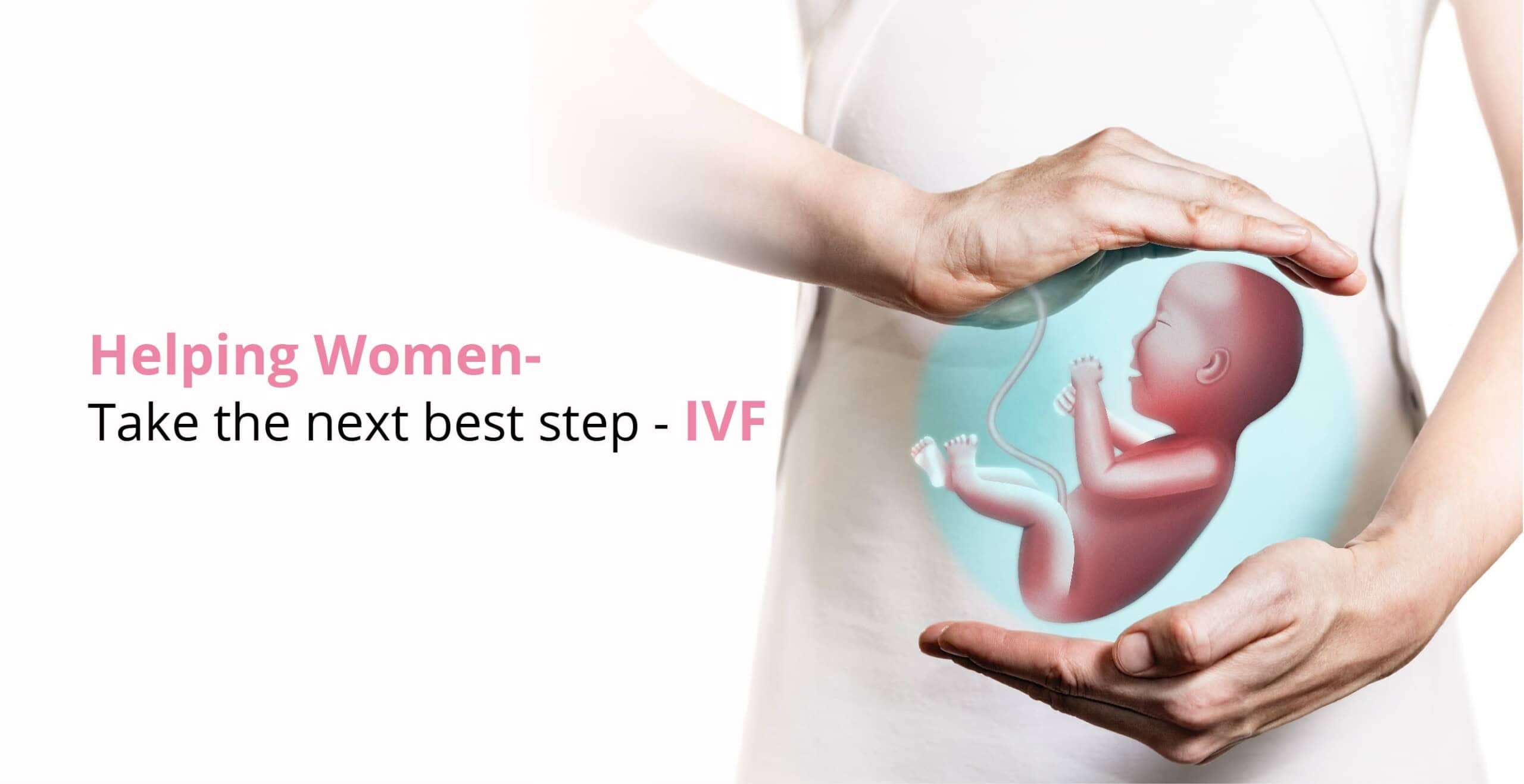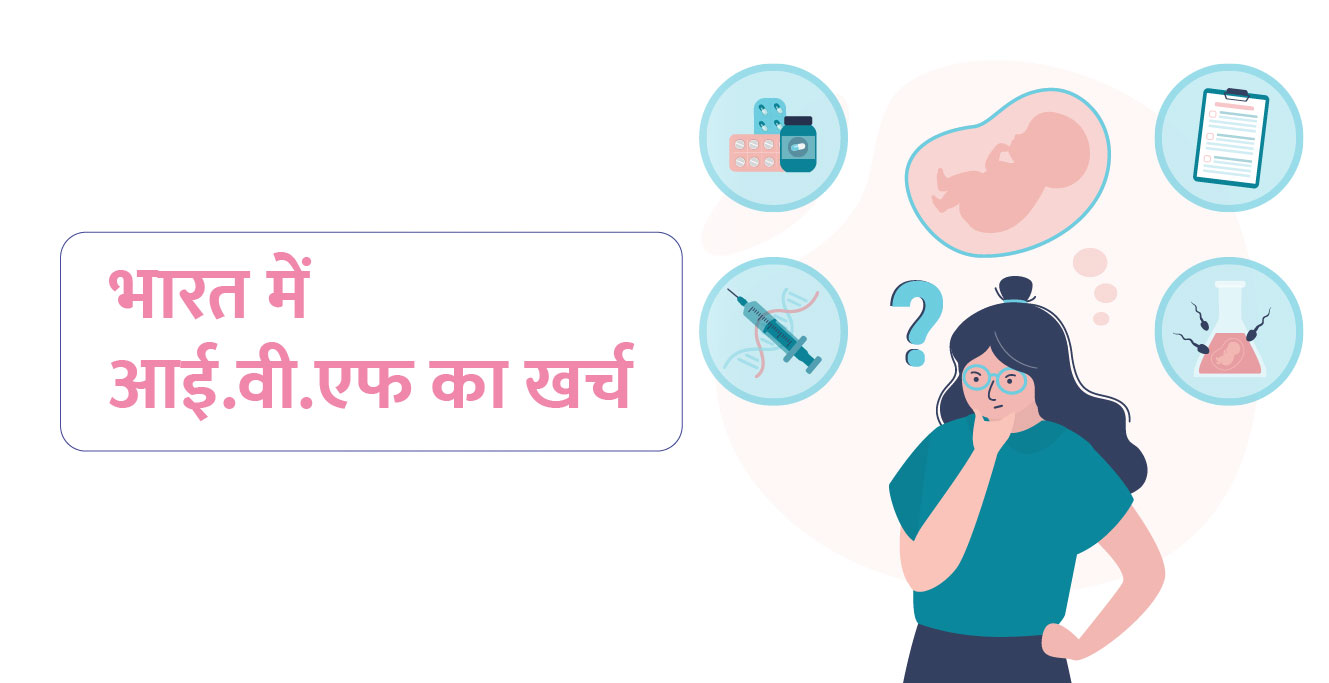Helping Women to Take the next Best Step- IVF
- Published on April 26, 2022

Taking the next step towards the journey of motherhood brings a wide range of positive and negative emotions. It’s exciting to think about having a child, starting a new family through a natural process or IVF treatment.
If you are worried about not having a baby after trying several times, you’re not alone as for couples with infertility issues, there is always an option of conceiving through IVF and other fertility treatments.
Being worried is typical, especially when a woman is trying to have a baby for the first time or has experienced a miscarriage or failed IVF cycles which can affect her mental health. The anxiety, stress and worrying about the process is due to a number of issues, including the length of time it takes, the loss of income, the expense, the strain on relationships and the medication’s side effects.
Some researchers have looked into the effect of psychological symptoms (such as anxiety and depression) on fertility. The majority of this research has been focused on women who have been diagnosed with infertility and have gone through various failed IVF treatments.
Table of Contents
Infertility in women can trigger by various factors such as:
1- Tubal Factors
2- Ovulatory disorders
3- Uterine factors
4- Cervical factors
5- Endometriosis
6- Unexplained infertility
Tubal Factors
When the fallopian tubes become clogged due to infections, damage, scarring, or blockages, it inhibits the sperm from reaching the egg for fertilization or prevents an embryo from reaching the uterus for pregnancy.
Ovulatory disorders
Ovulation disorders are irregularities in the formation of an egg (also known as an oocyte or ovum) during a woman’s menstrual cycle caused due to hormone balance.
Uterine Factors
Fibroids, polyps, scar tissue, radiation damage, and uterine injuries can all cause infertility.
Cervical Factors
The cervical factor occurs when the cervical mucus is not of the right consistency and does not contain the right amount of nutrients necessary or contains anti-sperm antibodies. These anomalies can make it difficult for sperm to pass through and fertilize the egg.
Endometriosis
Scarred fallopian tubes, inflammation of pelvic tissues, changed immune system functioning, alterations in the hormonal milieu of the eggs, and altered egg quality are all factors that can affect fertility.
Unexplained Infertility
Unexplained infertility is usually caused by low egg or sperm quality and uterine or fallopian tube disorders that aren’t detected during standard fertility tests.
It is always advised that you should seek medical help if you are facing any fertility issues.
How to deal with Anxiety and Depression during IVF treatment?
In vitro fertilization (IVF) can be a mentally, physically and financially exhausting experience. From your 1st visit only, the team of doctors and supporting staff at Birla fertility & IVF will make sure that depressed and stressed couples feel comforted and feel relaxed after meeting them.
Surround yourself with people having a positive aura
When trying to find someone to lean on, make sure the people you choose to tell about your IVF process are people with a positive aura. They should be sympathetic and empathetic towards your situation and are available to provide emotional support.
Avoid concentrating on things you cannot control
It’s easy to get caught up in the things we can’t change, but this can lead to feelings of powerlessness. Instead, focus on the areas of your life over which you have control.
Determine your stress and create a system of healthy coping mechanisms
IVF treatment is undeniably uncomfortable and daunting for women, so it’s necessary to treat yourself well throughout the procedure. Don’t be afraid to go out and give yourself some appreciating reward as you progress through the treatment. Try replacing negative and unhealthy activities with healthy ones such as meditating, listening to music to relieve stress, reading comic books or indulging yourself in your favourite hobby.
Reserve some time for your own needs
Never feel pressured or stressed throughout your IVF treatment. Always set aside time for your needs and avoid overthinking. Don’t be scared to spend time alone or to inform a friend that you prefer to relax or have a conversation about something other than your treatment.
Reframe and enable the way you think
If you’re anxious about your treatment and health, remember how much you’ve developed and strengthened yourself during the IVF process. If you’re debating whether or not to have a family, rest assured that you and the fertility experts at Birla Fertility & IVF are doing all that is necessary to ensure a healthy and safe pregnancy.
One day at a time
Don’t look too far in the future and stress over things that aren’t in your control. When you stop waiting for your life to begin and start making the most of the present moment, you will find happiness.
Deal with mood fluctuations
Fertility treatments can bring feelings of extreme hope and optimism and at times severe despair. You have to stop the feeling of being very pessimistic and focus on feeling optimistic and try to relieve the tension in between. Though feeling stressed and pessimistic is totally normal and understandable, it is important to deal with these mood fluctuations.
Challenges women face during IVF
Feeling emotional and distracted
Some individuals may find the first stages of IVF treatment to be draining and worrying. It’s normal and natural to be stressed and manage responsibilities while also being worried about the treatment’s outcome. It’s natural to feel confused and forget things, but it’s critical for patients to focus less on stress and give more importance to the good things in their surroundings.
Stress can augment your appetite
Due to stress, some patients may notice an increase in appetite, however, this may not happen to everyone. In general, certain medicines may enhance your appetite, an increased urge to eat is more common due to emotional factors. Just keep in mind to eat well and be healthy.
Half knowledge is worse than no knowledge
People are not aware of the procedure and the benefits IVF can bring to their life. Thinking that IVF treatment can jeopardize the chances of pregnancy is a myth, in fact, it may definitely increase your chances of becoming a parent sooner than later.
Social and behavioural
Infertility, for a couple, can be stressful and be filled with the emotional strain that is usually correlated with how long the couple has been trying or experiencing infertility problems.
Therefore, it is important to have access to support resources and fertility experts who can help you reduce the stress associated with the treatment. Fertility experts provide you with in-depth knowledge, navigate you with the benefits and customise your fertility treatments based on the problems. With this, patients are well-positioned to have a better overall experience from start to end, regardless of the outcome.
Clinical and Financial Stress
People prefer not to discuss their diagnosis and treatment with friends and family which can therefore add more stress to the already stressful situation.
Finding the right doctor or clinic before undergoing fertility treatment can be daunting. Once the doctor is finalized, it’s questionable if lab tests and treatments would improve success rates to justify the expense and risks.
Patients undergoing fertility treatments put everything they have into the process, physically, emotionally, and financially, in the hopes of becoming parents. Patients frequently face a variety of obstacles on their path to parenthood.
Gentle Reminder.
People who are having difficulty conceiving frequently find themselves discussing topics with their friends and family and indulge themselves in too much online research. As a result, they spend the vast majority of their time either discussing or researching infertility. Therefore, an activity or discussion that isn’t about treatment might be refreshing.
Let us focus on learning and listening instead of sitting and judging people with infertility problems. It is very easy for people to comment on people without understanding their problems and journey. Therefore, we should pay attention to the tales of individuals who have struggled with infertility. Instead of passing judgments or giving unsolicited advice on how to go ahead with the process, we should just be there to support them.
Why is infertility still taboo for women?
In today’s time, infertility is considered taboo, but it is important to understand that it is a condition that affects every 1 in 10 couples. Misconceptions regarding infertility are so common, and even people have wrong opinions about infertility, although these beliefs are scientifically false.
On a social level, infertility is connected with societal shame and taboo in most societies. Due to societal stigmatisation, couples who are unable to procreate may be looked down upon.
Therefore, it is always advisable to consult a doctor before making any judgement.
Birla Fertility & IVF will provide couples with the compassion and comfort they need at every step of their journey towards parenthood. At Birla Fertility, we provide not just treatment but an experience that will allow the couple to amply discuss their fears with a team of doctors and counsellors.
Consult with one of our specialists and start the initial steps toward becoming a mother. You can schedule your appointment to know more about fertility issues and their treatment options.
Related Posts
Written by:
Dr. Prachi Benara
Consultant
Dr. Prachi Benara is a fertility specialist known for her expertise in advanced laparoscopic and hysteroscopic surgeries, addressing a wide range of conditions including endometriosis, recurrent miscarriage, menstrual disorders, and uterine anomalies like uterine septum. With a wealth of global experience in the field of fertility, she brings advanced expertise to her patients' care.
Over 14+ Years of Experience
Gurgaon – Sector 14, Haryana
Our Services
Fertility Treatments
Problems with fertility are both emotionally and medically challenging. At Birla Fertility & IVF, we focus on providing you with supportive, personalized care at every step of your journey towards becoming a parent.Male Infertility
Male factor infertility accounts for almost 40%-50% of all infertility cases. Decreased sperm function can be the result of genetic, lifestyle, medical or environmental factors. Fortunately, most causes of male factor infertility can be easily diagnosed and treated.We offer a comprehensive range of sperm retrieval procedures and treatments for couples with male factor infertility or sexual dysfunction.
Donor Services
We offer a comprehensive and supportive donor program to our patients who require donor sperm or donor eggs in their fertility treatments. We are partnered with reliable, government authorised banks to source quality assured donor samples which are carefully matched to you based on blood type and physical characteristics.Fertility Preservation
Whether you have made an active decision to delay parenthood or are about to undergo medical treatments that may affect your reproductive health, we can help you explore options to preserve your fertility for the future.Gynaecological Procedures
Some conditions that impact fertility in women such as blocked fallopian tubes, endometriosis, fibroids, and T-shaped uterus may be treatable with surgery. We offer a range of advanced laparoscopic and hysteroscopic procedures to diagnose and treat these issues.Genetics & Diagnostics
Complete range of basic and advanced fertility investigations to diagnose causes of male and female infertility, making way for personalized treatment plans.Fertility Calculators
Empower your journey to parenthood with our fertility calculators. Accurate, personalized guidance for your fertility goals.








































